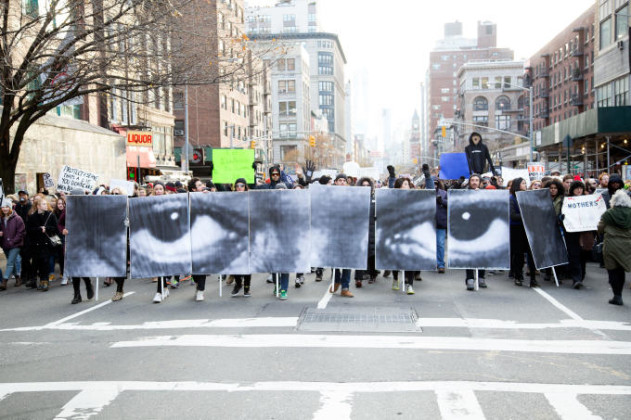As white people, we’ve been taught that our help is not just needed, but will fix everything. And that simply isn’t true.
I’ve been thinking about how to write about Saturday’s Million March in New York City, which I went on, and what it was like to be part of the group that shut down the Brooklyn Bridge and kept going through the streets of Brooklyn.
It’s a good story, but it’s also a story about me, and that is not relevant. (No, don’t do that reflexive thing where you say, “No, it IS important!”) Saying it’s not important isn’t a tactic to get pity, it’s not about martyrdom. I really mean, as a white person, it’s not important.
So instead of telling you about the protest, here are some things we, as white people, can do to be better at engaging with anti-racist actions.
1. Adjust your notion of what it means to “do something.”
As white people, we’ve been taught that our help is not just needed, but will fix everything. Folks of color always need it, even when they specifically ask us to step back. Because of white supremacy, white folks believe that we have to be part of everything and there are zero circumstances in which we wouldn’t be wanted. In other words, we’re entitled to space.
So “doing something” at an anti-racist action like the Million March, or anything you might attend directed at addressing racialized police brutality, means not starting the chants, not speaking to the press, not taking opportunities for power because we can and because other white people give them to us. It’s not about stepping back. It’s about realizing that in spite of what you’ve been taught about your white skin, you were never entitled to every single space.
2. Erase the concept of doing it perfectly.
I, you, we as white people do not understand what’s going on for people of color. That’s a truth. We don’t get what’s at stake, because it’s not our reality. You might think you’re the most empathetic person in the world, but you still don’t get it. (If you take nothing else from this piece, watch this remarkable video by Franchesca Ramsey, explaining allyship.) It’s not possible for everyone to understand everything, and for that reason alone, we as white people are going to mess up, in spite of trying. And fear of failing is real, but it is also a trap. If you’re too afraid to fail, you will be immobilized, and there is too much at stake here to let that happen.
3. Listen and read.
I’m not interested in feelings of discomfort here. I get that we have trouble listening and believing people, especially women and people of color. But this is not where I tell you how to be a better listener. That is what the Internet is for. I’m just going to assume that every time someone has told you that something terrible has happened to them, you have supported them. So keep listening.
People of color are narrating their own lives, in spite of what the media would have you believe. Change your media sources—if they’re dominated by white people, change the narrative. (Some suggestions: Black Girl Dangerous, Colorlines, The Root, For Harriet, Crunk Feminist Collective, Showing Up for Racial Justice, Young, Black and Gifted.) And also remember that there are spaces that are not for you as a white person (See number 1).
You do not have to do everything. I don’t even know what everything would be, but I am operating under the assumption that you care about racism, and not only racism that looks like police shooting unarmed black and brown people. If that is true, then you have to do SOMETHING. Getting arrested and committing civil disobedience is complicated, and has its own privilege problems associated with it, but you can find other ways to be present.
Do not, do not, do not disengage. Have those conversations with other white people on Facebook that you want to run from (this is as much a note to myself as it is to you, I’m terrible at this—I freeze). Share media made by black and brown folks. Don’t make black and brown folks do this work for you. They have enough going on.
This is not a thought experiment. This is about black and brown lives.
Chanel Dubofsky’s work has been published in RH Reality Check, Role Reboot, Cosmopolitan, The Frisky, The Billfold, Lilith and The Forward, among others. She is working on her MFA in Fiction at the Vermont College of Fine Arts and lives in Brooklyn, New York.
Related Links:

